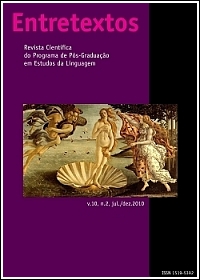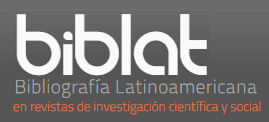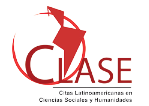A short reading gesture: Rigotto`s Campaign jingles under French Discourse Analysis bias
DOI:
https://doi.org/10.5433/1519-5392.2010v10n2p30Keywords:
Discourse analysis, Discursive formation, Heterogeneity, Campaign politicsAbstract
From the studies of the French Discourse Analysis, theory initiated for Michel Pechêux, this article brings an analysis of the campaign politics to the government of the state of the Rio Grande Do Sul, in the year of 2002, more specifically of jingles used by the candidate of the PMDB, Germano Rigotto, winner of these elections. From the concepts of discursive formation, heterogeneity and subjectposition, we have, in this work, a careful reading where we show the existing discursive movements in the material produced for then the candidate, had helped who it to arrive at the governing position.Downloads
References
FOUCAULT, Michel. A arqueologia do saber. 3.ed. Rio de Janeiro: ForenseUniversitária, 1987. 239p.
GADET, Françoise; HAK, Tony (orgs). Por uma análise automática do discurso: uma introdução à obra de Michel Pêcheux. Campinas: Unicamp, 1993. 319p.
HANAUER, Jeane Maria. Sexo seguro/voto seguro: a questão do sentido. In: INDURSKY, Freda; LEANDRO FERREIRA, Maria Cristina. Os múltiplos territórios da análise do discurso. Porto Alegre: Sagra Luzzatto, 1999. p. 138- 147.
LEANDRO FERREIRA, Maria Cristina. Glossário de termos do discurso. Porto Alegre: UFRGS, 2001. 28p.
ORLANDI, Eni Puccinelli. Análise do discurso: princípios e procedimentos. 5.ed. Campinas: Pontes, 2003. 100p.
ORLANDI, Eni Puccinelli. Discurso e texto: formulação e circulação dos sentidos. Campinas: Pontes, 2001. 222p
SANTOS, Leticia da Silva. Sujeito e sentidos em movimento na constituição do Orçamento Participativo de Porto Alegre. Cadernos de Letras da UFF, v. 37, p. 103-120, 2008.
SANTOS, Leticia da Silva. Orçamento Participativo de Porto Alegre: instaurando um processo de democracia. Revista do GEL, v. 5, n.1, p.129-146, 2008.
Downloads
Published
How to Cite
Issue
Section
License
Entretextos adota a Licença Creative Commons Attribution 4.0 International, portanto, os direitos autorais relativos aos artigos publicados são do(s) autor (es).
Sob essa licença é possível: Compartilhar - copiar e redistribuir o material em qualquer suporte ou formato. Adaptar - remixar, transformar, e criar a partir do material, atribuindo o devido crédito e prover um link para a licença e indicar se mudanças foram feitas.




















